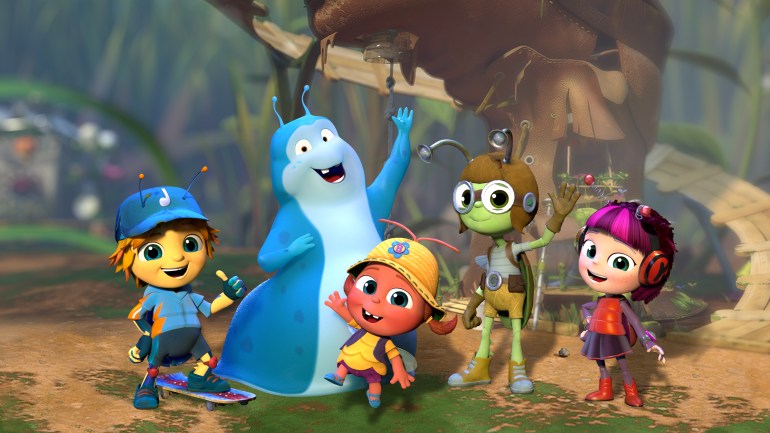Seven’s ‘Beat Bugs’.
Australia’s commercial free-to-air broadcasters have asked the government for sweeping changes to local content regulations.
The networks are calling for a revised points system that would reward higher-budget dramas and series that are commissioned rather than acquired.
Free TV Australia also wants production companies owned by broadcasters, most notably Seven Network’s Seven Productions, to qualify for Screen Australia funding, a move which has long been opposed by Screen Producers Australia (SPA)
However in common with SPA, Free TV advocates harmonising the TV and feature film producer offsets at 40 per cent and removing the cap of 65 episodes for dramas that qualify for the offset.
In its submission to the Australian and Children’s Screen Content Review being conducted by the Department of Communications and the Arts, the Australian Communications and Media Authority (ACMA) and Screen Australia, the lobby group restates its call to scrap the local content quotas for preschool viewers and children aged 5-13.
In another proposal that is likely to be fiercely opposed by SPA, Free TV wants the definition of first release changed to include dramas and documentaries when they are first broadcast on FTA, regardless of whether that is on a catch-up service, an alternative online platform or a social media channel.
Similarly, it seeks the abolition of an anomaly that means broadcasters get no points for screening dramas or miniseries that have been broadcast on pay TV.
“This would enable co-productions with subscription broadcasters and could allow greater resources to be committed to a broader range of drama content. In turn, this could provide Australians greater access to content previously only available to pay TV subscribers,” it says.
Free TV acting CEO Pamela Longstaff told IF: “We deliver almost 1,200 hours of children’s content per year. That is no longer viable when shows like Beat Bugs [on 7Two] are watched on average by 1,000 children. The quotas are no longer fulfilling their cultural objectives.”
Instead, commercial broadcasters could invest in more local content that is popular with a broad family audience.
Free TV released a report titled Changing Views: Australian Kids and Commercial Television, which revealed that, on average, children under the age of 13 now watch less than 40 minutes a day of commercial TV.
Only a fraction of that time is spent watching child-specific content as most are watching family entertainment programs such as MasterChef Australia, Australian Ninja Warrior and My Kitchen Rules.
The submission encourages the government to build on pubcaster ABC’s investment in attracting child viewers by making ABC the primary FTA service for delivering children’s programming.
In response, Australian Children’s Television Foundation CEO Jenny Buckland told IF: “The ABC does achieve higher audiences for children’s content but they have no Australian content quotas and no formal mandate to deliver Australian children’s television. Their record is quite variable. So the ACTF would like to see is a more transparent requirement for Australian children’s content on the ABC.”
More broadly, Buckland said the commercial broadcasters get higher audiences for children’s content on Saturday mornings and on Friday and Saturday at 6pm, observing: “This demonstrates they should schedule children’s content at times when children are showing they can watch TV in reasonable numbers, and build their audiences from there.”
Making the case for equalising the TV and feature film Producer Offsets, Free TV said: “There is now little technological distinction between film and TV production, and most are produced by the same pool of cast and crew talent. This can be seen behind the camera and in front, such as Nicole Kidman appearing in HBO’s Big Little Lies.”
It noted that, due to fragmentation, no local drama series has achieved an average five-city metro audience of more than one million on FTA TV this year.
Removing the 65-episode funding limit on dramas would allow networks to continue running shows that have an established viewership at home and overseas.
Endemol Shine Australia’s Offspring, which has exceeded that cap, incurs heavy losses for Network Ten, while Nine Network was forced to axe Playmaker Media’s House Husbands after 58 episodes.
The submission estimated SVOD providers clocked sales of about $400 million in the 12 months to mid-2017, growing at 100 per cent per year.
Free TV also restated its self-serving argument that the government should ensure the ABS and SBS are not undermining the health of the commercial sector by using public funds to compete in mainstream content areas where audiences are already well served.
Lastly, the body urged the government to resist measures that would water down copyright protections.
“Australian copyright law provides the fundamental framework that incentivises the production of local content and enables broadcasters and content creators to realise a return and continue to invest in the industry. This is crucial to protect our significant investment in the telling of Australian stories, “it says.
“However, that framework is under threat due to moves by Google and others seeking to weaken copyright protections for content creators. This must be seen for what it is – a strategy to gain access to more free content against which to generate revenue.””



